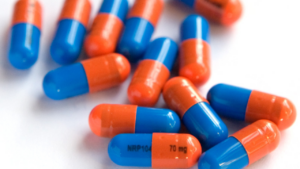Gabapentin may be a controlled substance, but that doesn’t mean it doesn’t have unwanted side effects or dangers. Gabapentin withdrawal is a big concern for people who have been using the drug over the long term. In fact, withdrawal symptoms are common in people who have taken the drug for as little as three weeks.
To learn more, call The Bluffs at 850.374.5331 and speak to one of our friendly team members about our drug detox program.
What Is Gabapentin?
Gabapentin is better known under the brand name Neurontin. It is prescribed to help treat postherpetic neuralgia (a certain type of nerve damage) and seizure. It is typically prescribed along with other medications. While effective for some people, gabapentin does come with a long list of possible side effects, including:
- Trouble talking, slurred speech
- Nausea, vomiting
- Viral infection
- Fever
- Mood changes (panic attacks, anxiety, and hyperactivity)
- Trouble concentrating
- Rashes, hives
- Yellowing of the skin or eyes
- Muscle pain
- Swollen glands
Emotional changes are the most severe side effect of taking gabapentin. Thoughts of suicide or suicide attempts may be rare but are also serious side effects. People with a history of depression or suicidal ideation may not be good candidates for gabapentin.
Gabapentin also interacts with several other common medications, including herbal supplements and over-the-counter drugs. Make sure that you share your full medical history with your doctor before taking this medication.
Does Gabapentin Have Withdrawal Symptoms?
Gabapentin can cause serious withdrawal symptoms that are similar to benzodiazepine or alcohol withdrawal. Like gabapentin, both of these substances affect the production of gamma-aminobutyric acid (GABA), an inhibitory neurotransmitter.
Gabapentin withdrawal symptoms include:
- Irregular heartbeat
- Nausea
- Muscle and bone pain
- Sensitivity to light
- Restlessness
- Fatigue, insomnia
- Headache
- Agitation
- Anxiety
Quitting gabapentin “cold turkey” (stopping all at once) may also cause seizures or increase seizure activity in those who already have them. It’s not advisable to withdraw from gabapentin on your own without proper medical supervision. A supervised detox program will provide the care and support needed to safely detox from the medication.
Gabapentin withdrawal symptoms typically begin within 12 hours of quitting the medication and can last up to 10 days. Factors that can affect the severity of symptoms include the patient’s age and general medical condition, the dosage they were taking, and any other co-occurring disorders, such as substance or alcohol use disorder.
To avoid withdrawal risks, most patients are advised to follow a tapering-off protocol. Tapering off is the practice of taking smaller and smaller doses until the person is completely weaned off the medication. Tapering off is a common practice when medications have the potential to cause severe side effects.
Does Gabapentin Have Withdrawal Symptoms Because it is Addictive?
Gabapentin can be addictive if misused. In large doses, it can affect the brain’s reward system, causing a high that’s similar to marijuana. However, physical dependence is the cause of withdrawal symptoms.
Dependence occurs when prolonged use changes the body’s normal response to the medication. Once the system becomes dependent on gabapentin to function, decreasing or stopping the dosage will cause withdrawal symptoms.
The Bluffs Offers Comprehensive Detox Services
At The Bluffs, our compassionate team understands that detox can be a difficult process under any circumstances. At best, it’s an uncomfortable experience, and at worst, it can be life-threatening.
Our detox programs address both the mental and physical symptoms of gabapentin withdrawal while keeping patients safe and comfortable.
Patients at The Bluffs receive the medical and emotional support they need to safely detox from gabapentin and meet their wellness goals. To get help with gabapentin withdrawal, call The Bluffs today at 850.374.5331.







